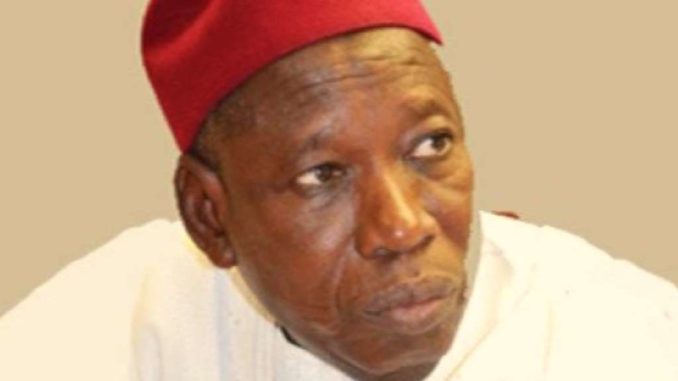
It seems the Lagos State government is gradually passing its own test. Other state governments must rise to the occasion. To Governor Ganduje: Duty calls. Thou shall not live by dollars alone.
The governor of Kano, Abdullahi Umar Ganduje, is in the eye of the storm. Reports of purported “mysterious” deaths in Kano raised eyebrows, given the spread of COVID-19 and casualty figures around the world. Media coverage of the deaths intensified, as prominent individuals, including the emir of Rano, academics, politicians, clerics, and parents of top politicians, died. Ganduje did not help his case when reports emerged that he was requesting ₦15 billion to fight the virus. Many Nigerians would have none of that. They had watched Ganduje’s fine performance in a short low-budget movie titled “How to store dollars in your babanriga”. His performance was so epic that he managed to win reelection in 2019. That meant that billions of naira were entrusted to him for another four years.
I have had some interesting conversations about Ganduje. His is a classic case of judging a book (for very valid reasons) by its cover — most people look at him and assume he is a know-nothing. He reminds me of a comment Nasir El-Rufai made about President Olusegun Obasanjo in his book, The Accidental Public Servant. El-Rufai notes that Obasanjo was “known for his sense of humour but not necessarily as someone that came across at first blush, as clever, witty or intelligent”. It was not meant as an insult. President Obasanjo corroborated the statement when El-Rufai offered to resign as head of the Bureau of Public Enterprises (BPE) because of political issues. El-Rufai quotes Obasanjo: “Well, my short friend, I am not going to discuss any resignation”. Obasanjo goes on to tell El-Rufai that he has three problems, each of which is “enough of a problem by itself, but you have all three”. The three problems? Being clever, looking clever and speaking like a clever person.
It was vintage Obasanjo. Obasanjo’s central thesis was that “People generally do not like clever people”. Obasanjo goes on to unfold the benefits of his looks: “But I am lucky — God gave me a not-so-clever face. People think I am stupid. So you can’t look at me and know what is going on in my brain… I behave like a bushman. See what that has done to me. I am here, far smarter people than me are out there.”
Therefore, I mean no disrespect to state what is on your mind — may God help the people of Kano; Ganduje does not look sufficiently smart to handle COVID-19. Unlike our short friend (sorry, Governor El-Rufai), Ganduje must have been despised, disrespected and under-estimated over the years because of his looks. I wonder what role that has played in his political rise and subsequent brutality and vindictiveness towards (perceived) opponents like Sanusi Lamido Sanusi. It may interest the reader to note that Ganduje has a PhD in public administration from the University of Ibadan. He is also an alumnus of Ahmadu Bello University and Bayero University Kano. But why has that not translated into effective governance? What is the use of education when it cannot uplift the people?
States and local governments in Nigeria have often managed to escape criticism despite poor performance since 1999. Local governments are virtually absent in almost all parts of the country. Many of their excellences have killed local governments. Some that are active merely share federal monetary allocations at the end of each month and the politicians return to the state capital or Abuja to wait for the next largesse.
Ganduje’s leadership issues remind me of a racist statement by a South African farmer quoted in Lincoln Addison’s book, Chiefs of the plantation. The farmer argued: “The only good thing about the ANC is that the world will see that blacks can’t run a country”. The farmer postulated that whites would return to power after 40 years. That should be a reasonable expectation in a democracy but the rationale of the farmer is disheartening. Addison notes that the farmer’s statement is a “familiar critique” of the ANC — South Africa’s ruling party. Of course, the farmer conveniently ignored the fact that the ANC had shepherded millions of black South Africans into the middle class, and enshrined into law some of the most beneficial policies for promoting gender equality anywhere in the world, among other outstanding results. Nonetheless, South Africa now engages in “load shedding” — routine interruptions in power supply. Reports about bureaucratic corruption have been embarrassing even for some party insiders. The ANC is giving its enemies and opponents (two collectivities that must not be construed as monolithic) valid discursive ammunition.
States and local governments in Nigeria have often managed to escape criticism despite poor performance since 1999. Local governments are virtually absent in almost all parts of the country. Many of their excellences have killed local governments. Some that are active merely share federal monetary allocations at the end of each month and the politicians return to the state capital or Abuja to wait for the next largesse. Routine tasks like garbage collection, drainage services, minor construction projects, maintenance of schools, hospitals, etc. have been abandoned. There are good reasons to focus on the federal government but for once state governments are being put to test. There is no hiding anymore. Healthcare is on the concurrent list of the constitution. State governments must prove their mettle.
It seems the Lagos State government is gradually passing its own test. Other state governments must rise to the occasion. To Governor Ganduje: Duty calls. Thou shall not live by dollars alone.
‘Tope Oriola teaches criminology and terrorism studies at the University of Alberta, Canada. Follow Oriola on Twitter: @topeoriola
END

Be the first to comment